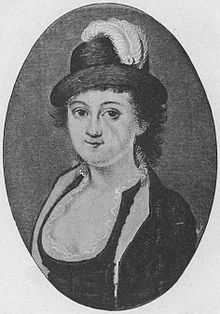Eve Frank

Eve Frank or Eva Frank (1754[1] – 1816 or 1817[2]), born in Nikopol, Ottoman Empire (now Bulgaria) under the name Rebecca[citation needed] or Rachel,[1] was the daughter of Jacob Frank, the claimant to the position of Jewish Messiah in the 18th century, and his wife Hannah Kohen.
Beginnings
Eve Frank received the name of Eve in 1760 upon the conversion of her family to Catholicism. For much of her life, she accompanied her father during his travels and after the death of her mother in 1770, the then 16-year-old Eve was declared to be the incarnation of the Shekinah, the female aspect of God, as well as the reincarnation of the Virgin Mary and thus became the object of a devotional subcult herself in Częstochowa, with some followers keeping small statues of her in their homes.[3] According to historian Jerry Rabow, she was the only woman to have been declared a Jewish messiah.
Jacob spread the rumor that Eve, who was often called "Eva Romanovna" at that point, was an illegitimate child of Catherine II of Russia.[4] Father and daughter repeatedly traveled to Vienna, and succeeded in gaining the favor of the court.[1] It is even said that Joseph II of Austria was favorably inclined to the young Eve Frank.[citation needed]
Later years
Upon the death of her father in 1791, Eve became the "holy mistress" and leader of the cult. Frank and her two younger brothers, Josef and Rochus, assumed responsibility for the direction of the court. Many people continued to go up to Offenbach am Main, to Gottes Haus, as the believers called it.
In 1800, the Franks sent "red letters" (in red ink) to hundreds of Jewish communities encouraging conversion to Frankist Christianity.[5] However, the Frank siblings had neither the stature nor the strength of personality required to keep the cult going and as time went on, the number of pilgrims and supply of money diminished drastically, all the while Eve had continued to live in her accustomed luxury.
In November 1813, after the battle of Leipzig, Tsar Alexander I, then emperor of Russia, rode from Frankfurt to Offenbach to visit Eve.[4]
Death and controversy
She finally became heavily in debt (three million gulden in 1817[2]), and died in poverty in 1816,[6] though she was rumored[1][2] to have escaped abroad after an arrest order from the Duke of Hesse. Nonetheless, her followers continued to exist well into the middle of 19th century; among these were the parents of Louis Brandeis, the US Supreme Court Justice.[7]
References
- ↑ 1.0 1.1 1.2 1.3 Frank, Eva article by Rachel Elior in the Encyclopedia Judaica.
- ↑ 2.0 2.1 2.2 Лжемессия: Яков Франк и франкисты, Z. Rubashev
- ↑ Maciejko, Paweł. The Mixed Multitude: Jacob Frank and the Frankist Movement, 1755-1816. Philadelphia: University of Pennsylvania Press, 2011:170-6.
- ↑ 4.0 4.1 1788: Ein Messias im Isenburger Schloss - die "Frankisten" in Offenbach, Lothar R. Braun
- ↑ Brawer, A. (1965). Galicia ve-Yehudeiha. pp. 197–275.
- ↑ http://www.radicaltorahthought.com/Bio%20Zvi_Frank.htm
- ↑ http://www.amazon.com/Louis-D-Brandeis-Melvin-Urofsky/dp/0375423664 Page 4
-
 This article incorporates text from a publication now in the public domain: Herman Rosenthal and S. M. Dubnow (1901–1906). "Frank, Jacob and the Frankists". Jewish Encyclopedia.
This article incorporates text from a publication now in the public domain: Herman Rosenthal and S. M. Dubnow (1901–1906). "Frank, Jacob and the Frankists". Jewish Encyclopedia.
-
 This article incorporates text from a publication now in the public domain: Joseph Jacobs and Schulim Ochser (1901–1906). "Offenbach". Jewish Encyclopedia.
This article incorporates text from a publication now in the public domain: Joseph Jacobs and Schulim Ochser (1901–1906). "Offenbach". Jewish Encyclopedia.